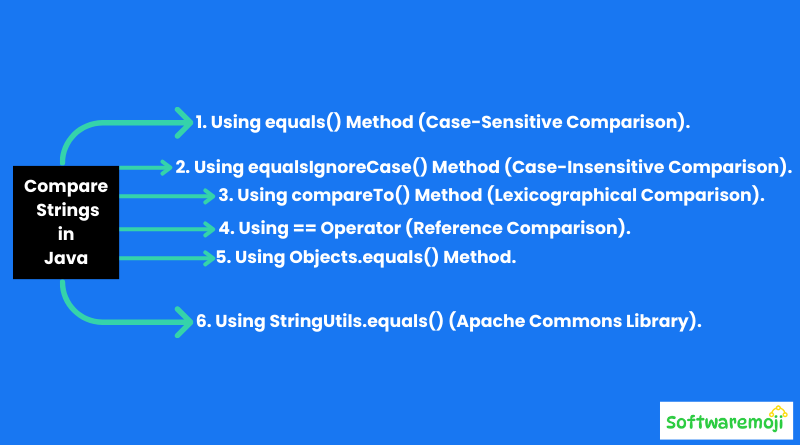
How to Compare Two Strings in Java:
- Learn the best ways to compare two strings in Java using
equals(),compareTo(), and==with real-world examples. - Java string comparison: Understand when to use
equals()vs==for accurate results in your code. - Master Java string comparison techniques with case-sensitive and case-insensitive methods like
equalsIgnoreCase(). - Boost your Java skills by learning how
compareTo()helps in sorting and lexicographical string comparison. - Find out why
Objects.equals(str1, str2)is a safer option for null-safe string comparison in Java. - Leverage Java’s
regionMatches()method for partial string comparison in complex programming scenarios.
String comparison is a common operation in Java, used for validating user input, sorting data, and implementing logic in applications. Java offers multiple ways to compare two strings, each with its own advantages and use cases.
📌How to Compare Two Strings in Java Why String Comparison in Java Matters?
String comparison is crucial for various programming tasks, including:
- Validating user input in web forms and applications.
- Implementing search functionalities.
- Sorting and ordering text-based data.
- Processing natural language inputs.
Understanding how to compare strings efficiently can improve the performance and accuracy of your Java programs.
- Java string comparison: Understand when to use
equals()vs==for accurate results in your code.
📌How to Compare Two Strings in Java Top Methods to Compare Strings in Java:
- Avoid common pitfalls in Java string comparison by understanding string pool behavior and memory management.
- Explore efficient ways to compare strings in Java for large-scale applications with performance optimization tips.
1. Using equals() Method (Case-Sensitive Comparison):
The equals() method compares two strings for exact equality, considering case differences.
Example:
public class StringComparison {
public static void main(String[] args) {
String str1 = "JavaProgramming";
String str2 = "JavaProgramming";
String str3 = "JAVAPROGRAMMING";
System.out.println(str1.equals(str2)); // true
System.out.println(str1.equals(str3)); // false
}
}2. Using equalsIgnoreCase() Method (Case-Insensitive Comparison):
Use equalsIgnoreCase() if you want to compare strings while ignoring letter case.
Example:
System.out.println("JavaProgramming".equalsIgnoreCase("javaprogramming")); // true3. Using compareTo() Method (Lexicographical Comparison):
compareTo() compares two strings based on dictionary order.
- Returns
0if both strings are equal. - Returns a negative value if the first string is less than the second.
- Returns a positive value if the first string is greater.
Example:
System.out.println("Apple".compareTo("Banana")); // Negative value
System.out.println("Banana".compareTo("Apple")); // Positive value
System.out.println("Apple".compareTo("Apple")); // 04. Using == Operator (Reference Comparison):
The == operator checks if two string objects point to the same memory location. It does NOT compare the actual content.
Example:
String s1 = "Hello";
String s2 = "Hello";
String s3 = new String("Hello");
System.out.println(s1 == s2); // true (same memory reference)
System.out.println(s1 == s3); // false (different memory references)5. Using Objects.equals() Method:
This method from the java.util.Objects class safely compares strings, avoiding NullPointerException.
Example:
import java.util.Objects;
System.out.println(Objects.equals(null, null)); // true
System.out.println(Objects.equals("Java", "Java")); // true
System.out.println(Objects.equals("Java", null)); // false6. Using StringUtils.equals() (Apache Commons Library):
If using external libraries, StringUtils.equals() from Apache Commons Lang is a reliable alternative.
Example:
import org.apache.commons.lang3.StringUtils;
System.out.println(StringUtils.equals("Hello", "Hello")); // true
System.out.println(StringUtils.equals("Hello", "hello")); // falseString comparison in Java made easy: Discover methods to compare user input, database values, and file contents.
Enhance your Java expertise with in-depth knowledge of string comparison techniques for clean and efficient code.
📌How to Compare Two Strings in Java Performance Considerations for String Comparison:
- Use
equals()for exact matches. Fast and efficient. - Use
equalsIgnoreCase()if case sensitivity is not a concern. - Use
compareTo()for ordering strings in sorting algorithms. - Use
==cautiously, as it checks memory references, not content. - Use
Objects.equals()when comparing nullable strings to avoid exceptions. - Use
StringUtils.equals()when working with external libraries like Apache Commons.
📌How to Compare Two Strings in Java Final Thoughts:-
Choosing the right method for string comparison in Java depends on the context and performance needs of your application. If case sensitivity is important, equals() is best. For sorting, compareTo() is preferable. If performance is crucial, avoid unnecessary object creation and prefer == when working with string literals.
Understanding these methods ensures optimized Java code and efficient string comparisons in real-world applications.
